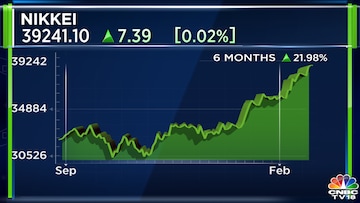Japanese stock markets are attracting investments from abroad, especially the US, driven by robust corporate earnings and appealing valuations, says Fook Hien Yap, a Senior Investment Strategist at Standard Chartered Bank.
Yap observes that Japan's market appeals to investors as it is still under-owned, and he anticipates the momentum in Japanese equities to persist for a while, given that foreign investments in the region tend to remain for extended periods.
“We see signs that with corporate governance improvements, encouragement from the Tokyo Stock Exchange, that is pushing companies to do more shareholder-friendly policies in terms of returning cash to shareholders. So, all this is enticing investors; of course, the geopolitical risks are relatively lower risk than in other parts of Asia. So that is why we think money is coming in and if this continues for the next few months, we do expect Japan can outperform global equities in the next 6-12 months," he noted.
The positioning in the US market, on the other hand, is slightly stretched in the very short term, he notes. However, he expects specific themes such as semiconductors and artificial intelligence (AI) investments will continue to drive the market over the next 6-12 months.
In the week to February 9, international investors stepped up their acquisition of Japanese stocks on diminishing worries about a possible policy change by the Bank of Japan (BOJ), per a Reuters report. Data from Japanese exchanges show that during the week, foreign buyers netted 817.43 billion yen ($5.44 billion) in local equities, their largest weekly net acquisition since January 12.
Foreign investors returned to Japanese stocks in 2023, after remaining net sellers in six out of eight years up to 2022, driven by corporate governance improvements and the yen's depreciation against the dollar. During the year, net foreign fund investments reached 6.3 trillion yen ($43.39 billion), marking the highest level of foreign inflows since at least 2014, per data from Japan's stock exchanges.
On February 26, the Nikkei closed 0.4% higher at 39,233.71, comfortably surpassing its previous closing record of 39,098.68. On February 22, the index had breached its all-time high from 1989, reaching 38,915.87. Over the past year, it has gained close to 43%.
JPMorgan Securities Japan Co. predicts that the Nikkei could climb to 42,000, representing an additional 7% increase. This uptrend is expected to attract more domestic investors to the market, as per the firm's analysis.
Also Read
For the entire interview, watch the accompanying video
(Edited by : Shweta Mungre)




